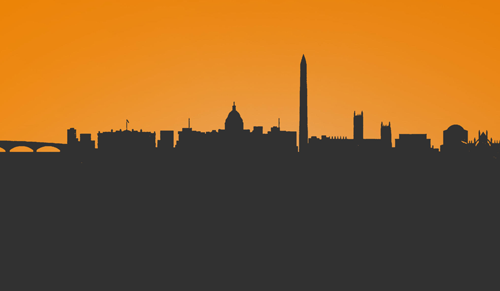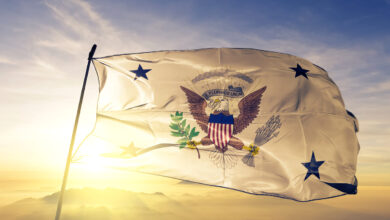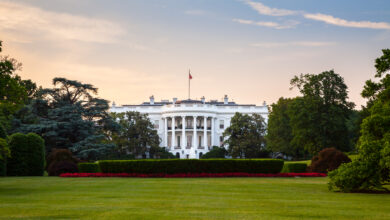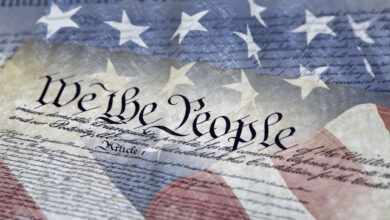
Islamophobia started long before 9/11. It very well may have also pre-dated the Iranian revolution, which took place 40 years ago this month. For me, that’s where I can trace it.
In 1979, I was a seven years old and mesmerized with the images that beamed into my family’s living room in the evening (a time when news was only nightly and only 30 minutes). I watched a black robed, turbaned, and long white bearded Ayatollah Ruhollah Khomeini walk off a plane on February 1 to wild crowds — miles and miles of people. I remember hearing about how America was “the Great Satan” but only connected any perceivable evil with the mullah that flashed on the screen. I had not understood that Iran’s leader, the Shah Mohammad Reza Pahlavi had fled two weeks earlier. It only would be a decade later that I would learn about why that Shah left — and how the majority of Iranians were angry that he had been reinstalled in 1953. That was the year the CIA overthew Iran’s democratically elected leader, Mohammad Mosaddegh. They weren’t happy Mosaddegh, who had come to power in 1951, nationalized oil. Sigh.
All I knew, as that eight year old, was that Khomeini was an enemy. That made me one too. We were both Muslim. I tried to explain to my third grade classmates that I was Turkish, not Iranian — as if that explained anything. It didn’t matter. Everything the media spouted talked about Islam and the danger it posed. No wonder Fox found a willing audience.
As the Iranian revolution turns 40 over this weekend, there is a lot of reflection on how Iran has fared, what Islam has done to its people, its economy. For me, it’s a time to reflect on how the revolution affected America. Indeed, what it did to U.S. attitudes and policies. As I do, I cringe.
If Iran’s revolution represented the birth of political Islam, for the U.S. it represents the excess of power — and shortsightedness. In 1953, Americans, egged on by the British, wanted to hold onto oil. They were willing to starve the Iranians of democracy to do so. Freedom disappeared in Iran long before 1979. What 1979 did do is give rise to the Muslim bogeyman. That made my seven-year-old world difficult. Far worse was how it has helped to make many Americans Islamophobes, including the current occupant of the White House. — Elmira
- Forty years on from Iran’s revolution: Mohammad Reza recalls welcoming the Ayatollah Ruhollah Khomeini back to Iran. Parisa Hafezi reports. (Reuters)
- What will it take for Washington to accept Iran as a “normal” state? Mahsa Rouhi explores. (Foreign Policy)
- “Iran’s middle class is both a blessing and a curse.” Najmeh Bozorgmehr on why Iranians believe another revolution is too costly. (FT)
- How has Iran’s economy fared since 1979? Nadereh Chamlou reflects. (Atlantic Council)
- Iran’s 1979 revolution and its legacies today — a podcast with Suzanne Maloney, Bruce Riedel, Jeffrey Feltman, Daniel L. Byman, and Elaine Kamarck — describing how the consequences of Iran’s 1979 revolution affected Iran. (Brookings)
As Venezuela turns….
It’s been two weeks since Venezuela erupted in political crisis. Juan Guaidó, the president of the National Assembly of Venezuela, assumed Venezuela’s interim presidency and called for elections. Nicolás Maduro, who has led the country since the death of Hugo Chavez in 2013, has remained steadfast.
- Without the continued support of Russia, China, and Cuba, how long could Maduro’s government last, Rocio Cara Labrador wonders. (CFR)
- Emiliana Duarte notes that the strangest observation she has had since the start of Venezuela’s revolution is that she is no longer the opposition. “For more than a decade, I have been fighting against a government. Now I am fighting for one.” (NYT)
- More than one million Venezuelans have fled to Colombia in the past two years, and the children bear the heaviest burden. It is time for the international community to make children’s education, health, and safety part of their humanitarian crisis response, write Caroline Kennedy and Sarah Smith. (Washington Post)
- Venezuela is becoming a Putin-Trump proxy battleground, writes Anna Nemtsova. (Daily Beast)
Make the Cold War relevant again!
Sigh. Last Friday, the Trump administration announced it will withdraw from the Intermediate-Range Nuclear Forces (INF) Treaty between what was the Soviet Union and the United States. It was signed in 1987, by then President Ronald Reagan and General Secretary Mikhail Gorbachev. It was back in 2014, when Barack Obama sat in the White House (#memories) that the U.S. noted that Russia was in violation of the treaty. This past October, the Trump administration said it would pull out of the treaty if Russia failed to put things right — that is, destroy the missile that violates the treaty. Russia didn’t. Will this trigger a new arms race? Read on….😳
- What is the INF Treaty and why does it matter? Megan Specia and Andrew Kramer break it down. (NYT)
- Trump is igniting a dangerous new nuclear arms race, says Katrina vanden Heuvel. (Washington Post)
- U.S. withdrawal from INF could jeopardize other arms control agreements, write Robbie Gramer and Lara Seligman. (Foreign Policy)
Read the entire FP Interrupted Newsletter here. Subscribe to FP Interrupted here.




